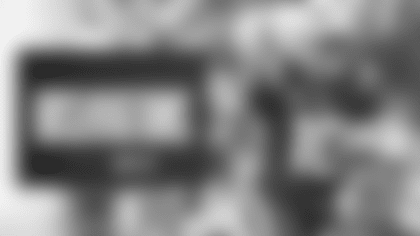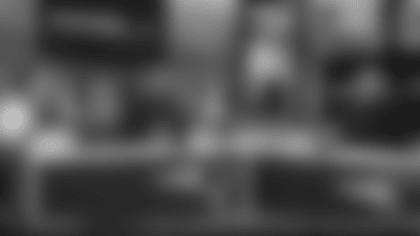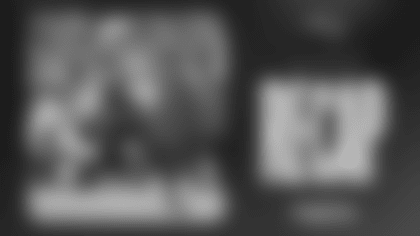Patriots defensive coordinator Dean Pees addresses the media during his conference call on Tuesday, November 24, 2009.
Q: Having watched Tully Banta-Cain this season, how has he developed as a player in that time in San Francisco between the first years of his career and now?
DP: I think early on he was playing behind guys like Willie McGinest, Rosevelt Colvin and Mike Vrabel, and was used primarily on special teams. So I think all during those years he learned a lot from those guys and has just kept working hard. [He] left us for a little while and came back, but was fairly familiar with how we do things and what we're probably going to expect from him on defense. I think he's handled it very well. He works hard at it. There are always things that all of us, including him, can improve on, but I think he's come back and he's been in good shape and worked real hard at it. I think he's developed mentally as an outside linebacker but [also] as a pass rusher, so I think he's worked very hard at it.
Q: When you size up the New Orleans Saints, what are the concerns that jump out at you right off the bat in terms of preparing for them?
DP: Well, the number one thing I think you look at is the fact that they have just about as many runs as they do passes. They are just a very, very balanced football team. I don't know what exactly the numbers are, but I know they're averaging about 150 yards rushing and whatever it is passing. I mean, it's a very prolific offense and they have so many weapons. The guys catch the ball. They've got good tight ends. [They've got] a number of backs besides [Reggie] Bush. I mean, all these guys run the ball. In fact, the other two run it even more than he has, so it's just a very, very balanced offense. And I think somebody brought up to me the other day [that] it's almost within five or six plays of being the same number of runs as passes. That's always tough to prepare for when you have such a balanced attack.
Q: In terms of the size of some of their receivers - guys like Marques Colston- these extremely large guys are almost like tight ends in a sense. Do you see it that way?
DP: Yeah, it's no different than like at Denver or there are some other teams that always have these big receivers. But the thing about them is not only their size, but they all have a great ability to catch the ball. I think sometimes everybody looks at well, they're a big guy matched up on a corner or whoever they might be matched up on. It's the fact that they've all gone up and caught the ball, whether it be in a crowd, good coverage, across the middle, whatever. I think the biggest thing about them is that they're all willing to go wherever they need to to catch the ball and willing to go up and get it. That certainly presents a challenge for us.
Q: I know that last week against the Jets, getting pressure on Mark Sanchez was effective because it forced him to make decisions - obviously not always the best decisions all the time. Can you pressure Drew Brees? Does he make those kinds of mistakes or is he kind of one of those unflappable guys?
DP: I don't... I think it's hard to say, really. I don't see a lot of teams pressuring him. Most people I think feel kind of like, you know, he's a very, very smart and intelligent quarterback. He knows where to go with the ball. He does a really good with the cadence and command of the offense. He does all those things. I don't know that anybody can't be pressured, but at the same time I think you've got to...You know, hey, sometimes you're going to do a little, sometimes you're not. It's all going to be based on a lot of different things, based on our personnel that we decide to go with, based on what personnel that they have in the game, what their formations are, what their sets are. Some formations are easier to pressure than others, so it really varies. Like I said, they've done a great job of probably not getting a lot of pressure because they keep everybody so off balance with their formations and their personnel. Last week was last week. The Jets are just an entirely different type of team than the Saints, and we'll just have to see what direction we need to go in to try to be successful.
Q: Can you compare this Saints offense to any offense you've seen thus far? Are they similar to the Colts at all in their explosiveness, or are they just an entity unto themselves?
DP: I think they have their own identity. I think they're both very, very excellent offenses. One is a multiple formation, shift, move-around team. The other one barely moves and is just as effective, so I don't think you can compare them. I think they are both just very, very good offenses and both able to move the ball, both have very, very smart quarterbacks that know where to take the ball.
Q: Can you talk a little bit about Vince Wilfork's play? Most people just look at stat sheets, but obviously it's much more than that - what he's asked to do and things like that. Can you just talk about how well he's playing this year and how well he's filling his role?
DP: Sure. I think he's...you know, I don't watch a lot of other nose guards; I'm too busy watching everybody else's offense, but Vince does a great job for us. We're able to move him around, whether it be at nose tackle or move him out to end if we need to move him to end. He's a very intelligent football player. Besides being a very good defensive lineman, he's a very intelligent defensive lineman. And generally what happens is on most defenses - unless you get in to sacks and some things like that - basically in the running game, if the linebackers are making a lot of tackles and they're not gaining a lot of yards, it's usually because your defensive line is playing fairly well and it has taken a couple of them to block him. And so sometimes you're right, the stat sheet may not show up just how well somebody played. They may not have a lot of tackles, but if they're using up two guys to block them, that means that somebody else has the chance to make the tackle. And Vince does what we ask him to do within the scheme and he does it very, very well, and I can't tell you how much he means to our defense.
Q: How effective is their offensive line both in pass blocking and run blocking?
DP: Well, obviously they're the number one offense in the league, so they're pretty good at both, and that's the thing about them. Like I said, they're very balanced. They're averaging 150 yards rushing and whatever it is - two something - passing. And I don't think he's [Brees] been hit a lot and he hasn't been sacked a lot, so you've got to say they're doing a very, very good job.
Q: They're really tough to penetrate?
DP: Well, I just think they do a good job with the whole scheme. Sean [Payton] does a good job, too, of calling the plays and doing formations and keeping everybody off balance. So it's not only the offensive line, it's the scheme, it's Drew [Brees] putting people in the right spots, getting rid of the ball on time, receivers getting open. I mean, it's never one thing. It's not just all the offensive line or all the skill players, it's just they've coordinated the whole thing together and that's why they're playing so well on offense.







































